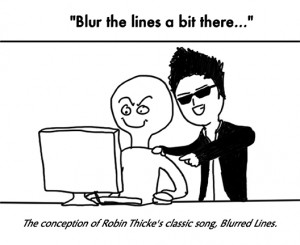Robin Thicke and Pharrell Williams’ “Blurred Lines” has come under scrutiny for copyright infringement. Artists and music lovers should worry.
A Los Angeles jury found Thicke and Williams guilty of copyright infringement March 10, and $7.4 million was awarded to the children of Marvin Gaye whose 1977 hit “Got to Give it Up” resembles “Blurred Lines” in sound and vibe, though it is hard to pinpoint precisely which elements of the song were copied.
Attorney Howard E. King, working for Thicke and Williams, plans to appeal the charge. He told Fox Business Network, “We owe it to songwriters around the world to make sure this verdict doesn’t stand.”

If this case becomes precedent, an endless number of lawsuits could arise over copyright infringement because music has a history of borrowing, sampling and just generally building on what has been done already.
Bonnie McKee, a singer-songwriter who has co-written hits with Katy Perry, Kelly Clarkson and Kesha, worries this case will lead to more disputes over such intangible concepts as the feeling or vibe of a song.
“Copyright for composition is starting to be enforced in a manner very similar to the copyright for sound recording,” McKee said in a broadcast interview with NPR’s Tom Ashbrook. “Compositions had a lot more freedom in the past. Any sound no matter contents or duration is eligible for copyright. Artists used to be freer to borrow without being sued.”
In another recent copyright dispute, Tom Petty and Jeff Lynne were made co-writers of “Stay With Me,” Sam Smith’s song that has since won the Grammy for Song of the Year. The chorus of Smith’s song has similarities to Petty’s 1989 “I Won’t Back Down.”
These kinds of copyright disputes within the music industry are nothing new.
George Harrison was found guilty of subconscious plagiarism for his 1971 hit “My Sweet Lord.” It was decided that he had not intentionally plagiarized, yet his song showed only minor differences to a 1962 release by The Chiffons.
These cases are difficult to resolve. It is hard to draw a line between taking inspiration from a song and copying. Artists should be recognized for their work. Musicians should respect earlier artists who influence their music.
What is unique to the case involving Thicke, Williams and the Gaye family is the jury ruled against “Blurred Lines,” which resembled “Got to Give It Up” in vibe and groove only. Both songs include a cowbell and similar tempos, but the patterns and rhythms are clearly different.
Protecting the essence or vibe of a song as intellectual property under copyright creates a huge challenge to new artists. These disputes might be avoided if they were seen as a compliment by younger artists to take influence from the work of those they admire.
Instead, it is easy to get caught up seeking ownership over one’s work. Keeping too tight a grip on individual intellectual property is a hindrance in creative professions where new work is created on the shoulders of previous creations.
What has already been done influences and inspires artists to create something new.
Attempting to regulate influence seems a nearly impossible task with great risk of limiting creativity.
























